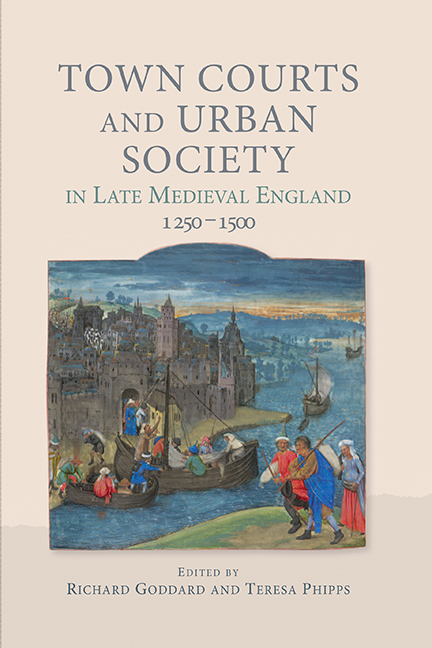Book contents
- Frontmatter
- CONTENTS
- List of Illustrations
- Contributors
- Acknowledgements
- List of Abbreviations
- Introduction
- Jane Laughton: In Memoriam
- 1 Town Courts in Medieval England: An Introduction
- 2 Borough Court Cases as Legal Precedent in English Town Custumals
- 3 The Priest of Nottingham and the Holy Household of Ousegate: Telling Tales in Court
- 4 Female Litigants and the Borough Court: Status and Strategy in the Case of Agnes Halum of Nottingham
- 5 Courts and Urbanisation: Jurisdiction in Late Medieval Seigneurial Boroughs and Towns
- 6 The Business of the Leet Courts in Medieval Norwich, 1288–1391
- 7 The Black Death and the Borough Court: The Changing Pattern of Social and Judicial Representation in Late Medieval Lincoln
- 8 Justice and Jurisdictions in Late Medieval Chester
- 9 Trust: Business Networks and the Borough Court
- 10 Society, Status and the Leet Court in Margery Kempe's Lynn
- Appendix: An Annotated List of Printed or Online Transcriptions and Translations of Medieval Town Courts in Britain to 1500
- Bibliography
- Index
6 - The Business of the Leet Courts in Medieval Norwich, 1288–1391
Published online by Cambridge University Press: 14 September 2019
- Frontmatter
- CONTENTS
- List of Illustrations
- Contributors
- Acknowledgements
- List of Abbreviations
- Introduction
- Jane Laughton: In Memoriam
- 1 Town Courts in Medieval England: An Introduction
- 2 Borough Court Cases as Legal Precedent in English Town Custumals
- 3 The Priest of Nottingham and the Holy Household of Ousegate: Telling Tales in Court
- 4 Female Litigants and the Borough Court: Status and Strategy in the Case of Agnes Halum of Nottingham
- 5 Courts and Urbanisation: Jurisdiction in Late Medieval Seigneurial Boroughs and Towns
- 6 The Business of the Leet Courts in Medieval Norwich, 1288–1391
- 7 The Black Death and the Borough Court: The Changing Pattern of Social and Judicial Representation in Late Medieval Lincoln
- 8 Justice and Jurisdictions in Late Medieval Chester
- 9 Trust: Business Networks and the Borough Court
- 10 Society, Status and the Leet Court in Margery Kempe's Lynn
- Appendix: An Annotated List of Printed or Online Transcriptions and Translations of Medieval Town Courts in Britain to 1500
- Bibliography
- Index
Summary
Norwich was one of medieval England's most populous and wealthiest towns. Located in the east of England, where the frankpledge system is thought to have originated and where it endured longest, Norwich has the earliest surviving borough leet rolls and provides an ideal case study of how early leet courts functioned. The Norwich leet court met annually to hear and punish misdemeanours (minor crimes punishable by fines) that affected the urban community. As with the equivalent courts in other towns, it did not have jurisdiction over felonies (serious offences which could lead to a death sentence), nor did it hear private suits. The city coroners dealt with suspicious deaths, while the justices of the gaol delivery courts heard reports of felonious crimes. Individual pleas, largely consisting of property disputes and civil pleas, were heard at the city court (curia civitatis), over which the town bailiffs presided.
Because the leet court heard cases that affected the well-being of the community, its records furnish a unique insight into the shifting values and needs of the urban community and to the concerns of middling level men. This chapter uses the Norwich leet rolls to provide a case study answering several questions about urban leet courts: how did the leet court work? What punishments could the court dispense and how effective were these penalties? What can the records reveal about the concerns of Norwich residents and how they changed over the course of the fourteenth century?
In order to address these questions, this chapter draws upon eleven surviving leet rolls from Norwich. The first seven rolls record the business of the court between 1288 and 1300. There is also a fragment from a roll created around 1307 and three rolls from 1313, 1375 and 1391. The rolls from 1288, 1290 and 1307 are presentment rolls, which means that they record the names of the capital pledges (who served as presentment jurors) along with the accusations they made. They do not, however, contain any information about the penalties assessed. Of these three, only the 1288 roll survives in its entirety. The eight remaining rolls take the form of amercement rolls, which list the charges along with the fines assessed, although the 1289 roll is the only one that indicates the amounts actually collected.
- Type
- Chapter
- Information
- Publisher: Boydell & BrewerPrint publication year: 2019
- 1
- Cited by



